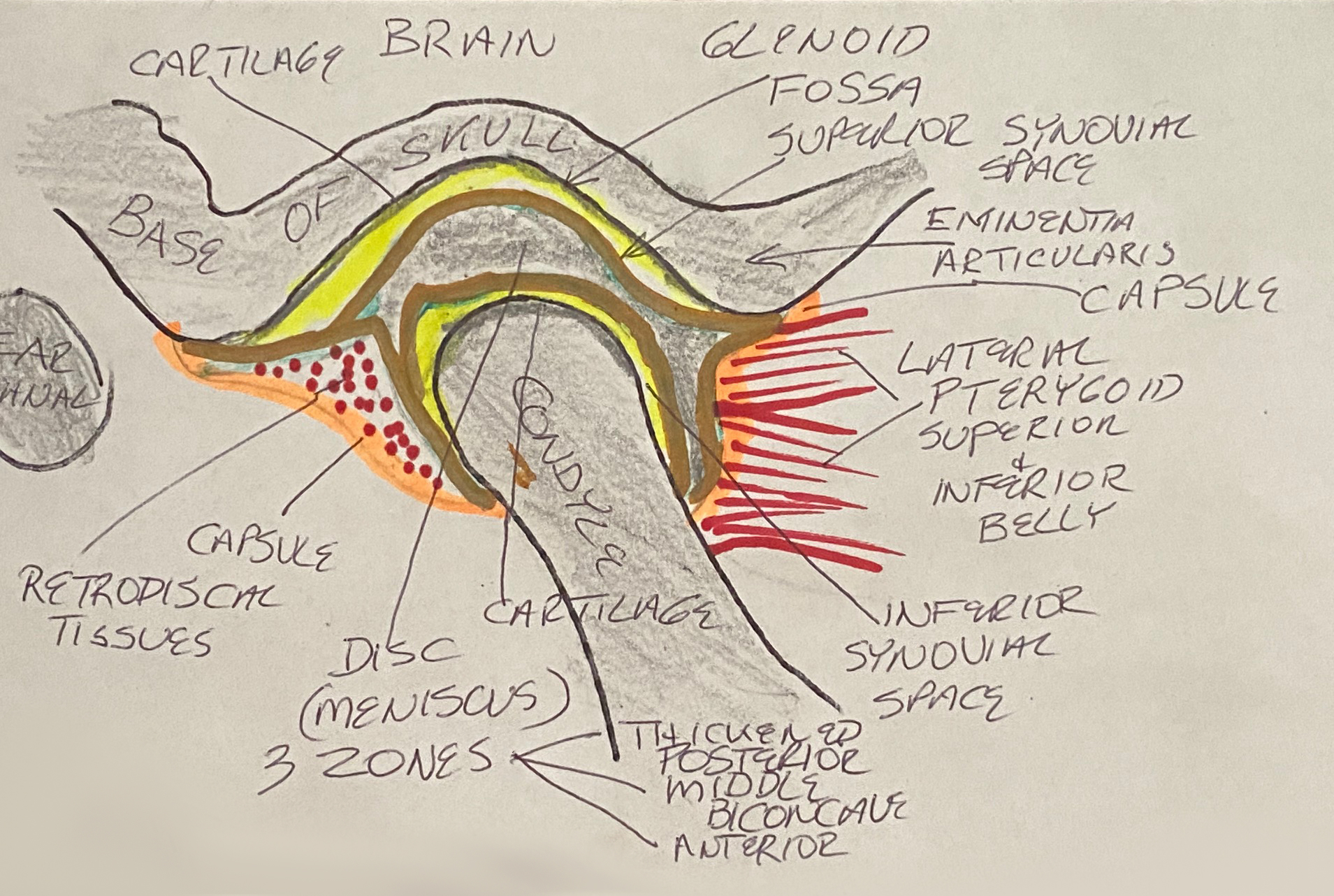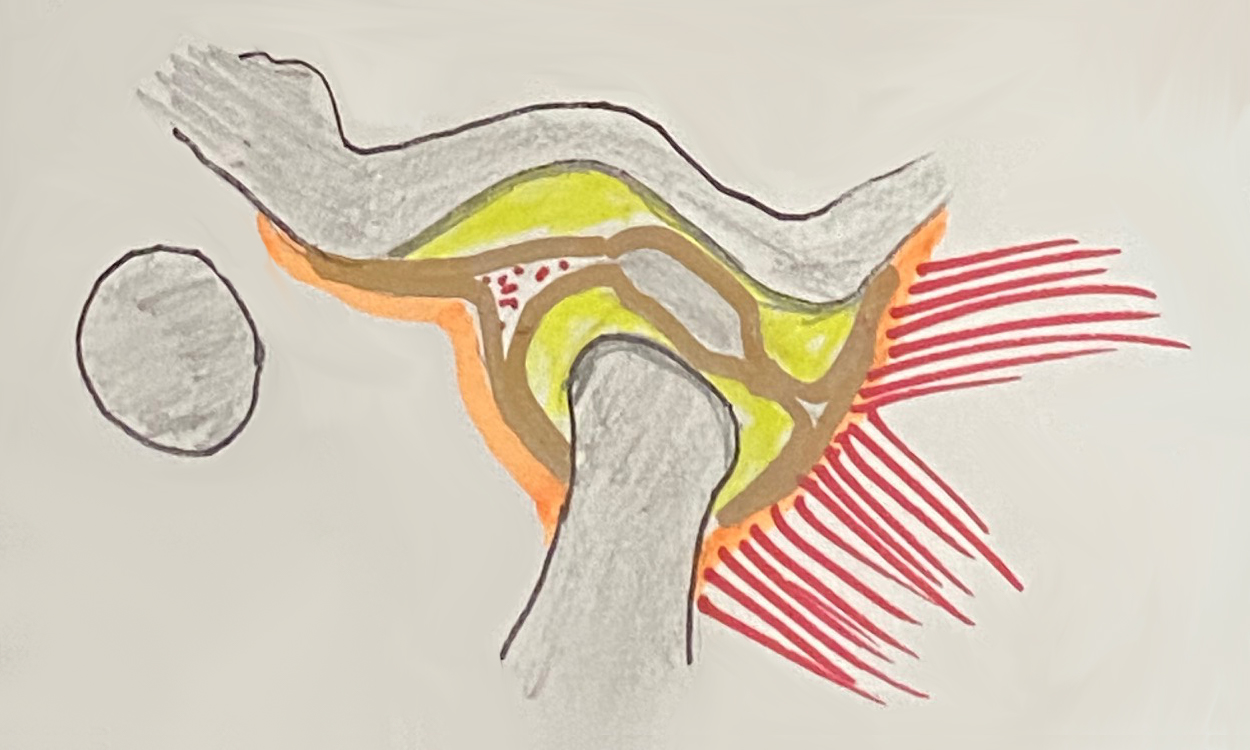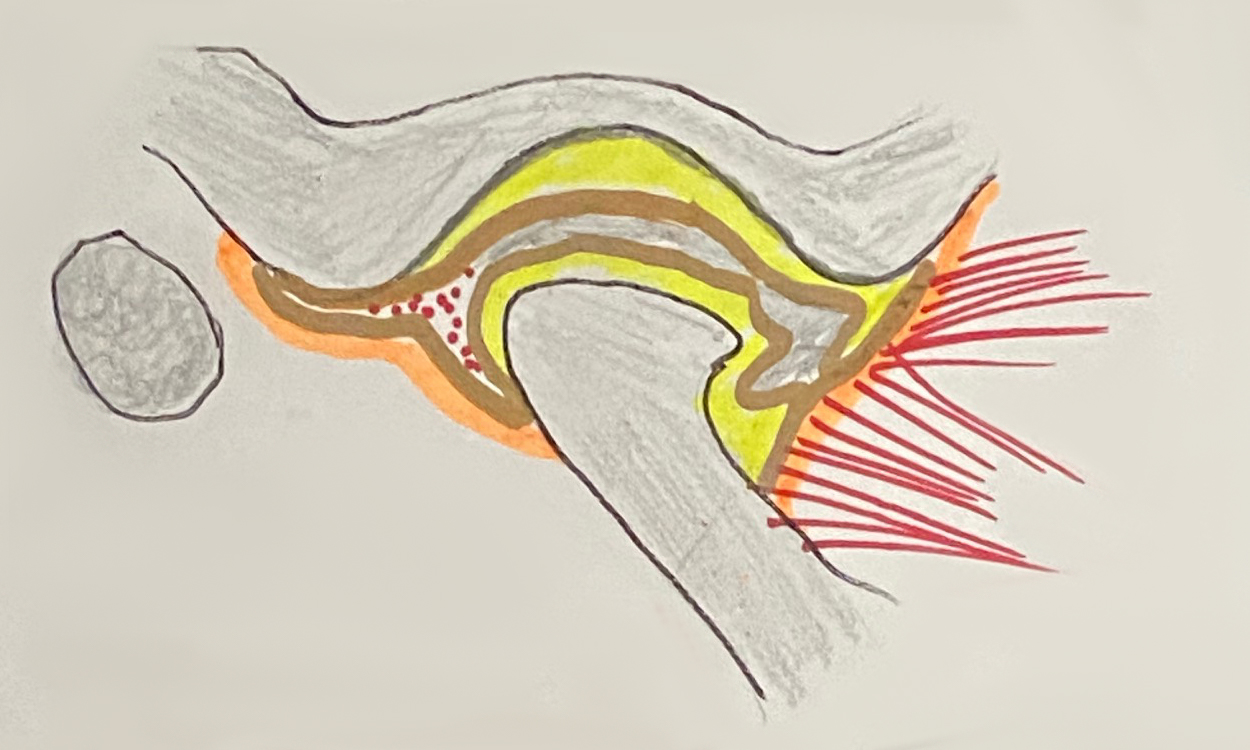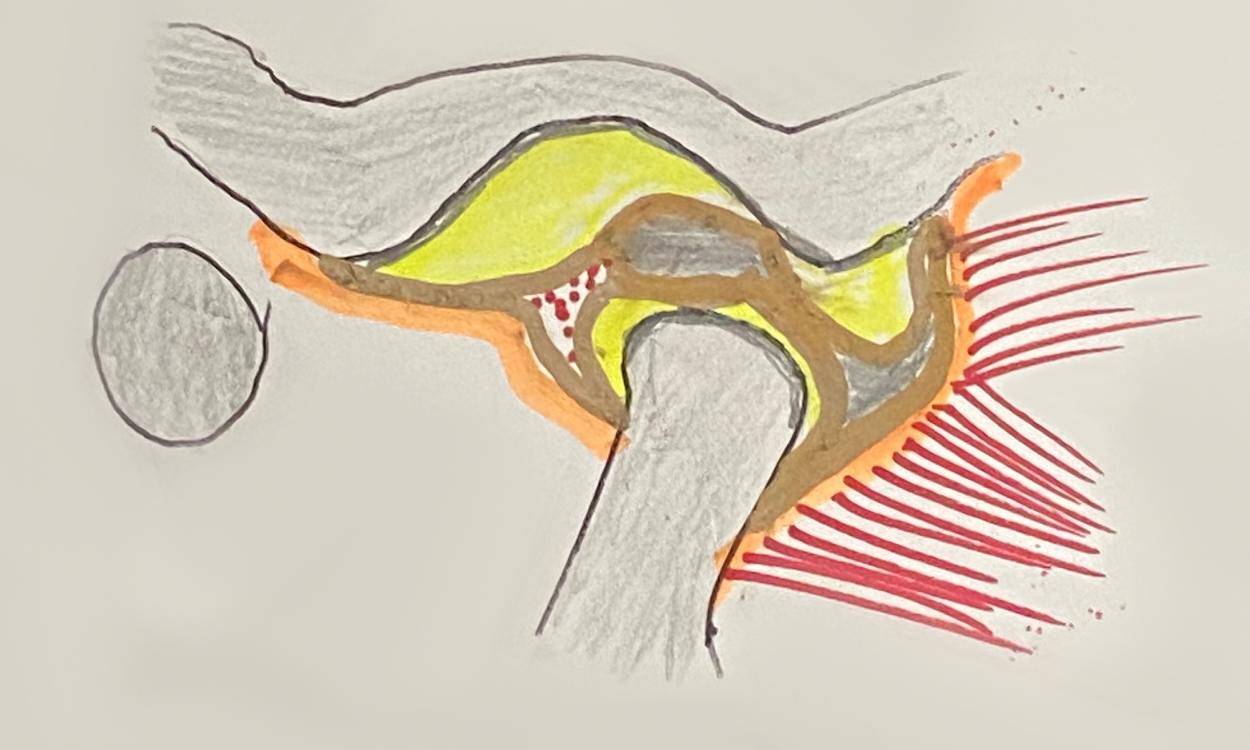TMJ Pain & TMJ Disorders Cairns
At Future Dental, we have decades of experience in relieving the chronic pain that comes with TMJ disorders.
The temporomandibular joints (TMJ) are the joints that connect your jaw to your skull. Temporomandibular joint (TMJ) disorders encompass a range of conditions involving the jaw joints, the muscles of the jaw, or both. These joints are located in front of your ears and can lead to pain in the jaw.
What causes TMJ pain and TMD?
TMJ symptoms of pain is often caused by inflammation of the joint (capsulitis) or by internal derangement where the fibro-cartilage disc (meniscus) becomes pulled forward in the joint by the pterygoid masticatory muscles.
 Normal healthy TMJ position with labels of each part.
Normal healthy TMJ position with labels of each part.
The disc is protective and prevents the cartilage and bony head (condyle) of the jaw from rubbing against the cartilage and bone of the glenoid fossa in the temporal bone of the base of the skull.
The lateral pterygoid muscle pulls the jaw open, forward and from side to side and, if overactive, can displace the disc forward in the joint capsule. The superior retrodiscal ligament is part of the stabilisation of the disc, but, being a ligament, can be stretched by hyper-activity of the pterygoid muscles, but cannot return to its original length. This leaves the disc vulnerable to being pulled out of its position.
The disc, in its normal healthy position with the mouth closed or nearly closed, sees the biconcave part of the middle of the disc sitting immediately between the condyles and the anterior slope of the bony front wall of the fossa in the base of the skull.
 Closed position showing some arthritic changes and disc displacement without reduction.
Closed position showing some arthritic changes and disc displacement without reduction.
 An open mouth with a normal appearance.
An open mouth with a normal appearance.

An open mouth with disc displacement with reduction.
A displaced disc can be pulled forward, inwards and less commonly outwards. Once pulled forward, on opening, the condyle passes over the thickened posterior band of the disc, creating the audible click that can be felt. A click on its own is not only very common but also requires no treatment. The disc can also break down, perforate, or distort.
A TMJ can become dislocated, and this renders it very difficult for the patient to open and close the mouth. This is easily and rapidly treated in the dental office, but those who are susceptible to this, need to support their jaw with the palm of the hand when yawning and avoid opening very wide to bite on hard chewy foods.
Arthritis can affect the TMJ as well. Inflammation of the joint is termed Capsulitis and is mildly painful to touch and may feel hot to touch and may become moderately painful on the movement of the jaw.
How TMD is treated
The course of treatment which you undergo for your TMD will be dependent on your symptoms and their severity, as well as your age and general health.
Treatment may include resting and relaxation, ice or heat packs, behavioural changes to reduce bruxism, physical therapy, orthopaedic appliances such as occlusal splints, posture training, diet changes, and in extreme cases, surgery.
For More Information about Managing TMD, download this handout here.
Frequently Asked Questions
What is TMJ?
TMJ stands for temporomandibular joint, which is the joint connecting the jawbone to the skull. It allows for movement of the jaw, such as chewing, talking, and yawning. TMJ disorder (TMD) refers to a condition where there is pain or dysfunction in the jaw joint and the muscles that control jaw movement. TMD can be caused by various factors, including jaw injury, teeth grinding or clenching, stress, arthritis, or a misaligned bite. Symptoms may include jaw pain or stiffness, difficulty opening or closing the mouth, clicking or popping noises when opening or closing the mouth, headaches, ear pain, or facial pain. Treatment for TMD may include self-care measures, such as avoiding hard or chewy foods and using ice or heat therapy, as well as medication or physical therapy, and in some cases, surgery.
How do you diagnose TMJ disorder?
TMJ disorder is typically diagnosed through a combination of medical history, physical examination, and imaging tests such as X-rays, CT scans, or MRI scans. Bite analysis may also be used to identify any abnormalities or misalignments. Based on the results, your doctor or dentist can determine the best treatment plan for your specific condition.
What problems are associated with TMJ?
TMJ disorder (TMD) can cause jaw pain, difficulty opening or closing the mouth, clicking or popping noises, discomfort while chewing or speaking, headaches, facial pain or swelling, and tooth wear or damage. In severe cases, TMD can lead to chronic pain or arthritis and affect daily activities such as eating, speaking, and sleeping.
What are the common symptoms of TMJ disorders?
TMJ (temporomandibular joint) disorders commonly present with symptoms such as jaw pain, facial pain, and difficulty chewing, often accompanied by clicking or popping sounds in the jaw joint. Patients may also experience locking of the jaw, muscle stiffness, headaches, and earaches. Changes in bite, neck and shoulder pain, and in some cases, dizziness or vertigo, can also occur. Symptoms vary in severity and not all individuals will experience all symptoms. Seeking evaluation by a healthcare professional is recommended for the proper diagnosis and management of TMJ disorders.
What are the potential causes of TMJ disorders?
TMJ (temporomandibular joint) disorders can have several potential causes, including jaw injury, arthritis, excessive teeth grinding or clenching (bruxism), stress, or a misaligned bite (malocclusion). Other factors, such as poor posture, chewing gum excessively, or habits like nail-biting, can also contribute to the development of TMJ disorders. Additionally, structural issues affecting the jaw joint or surrounding tissues, such as disc displacement or degenerative joint disease, can lead to TMJ disorders. Understanding the underlying cause is important for determining the most effective treatment approach.
Can TMJ disorders affect other areas of the body?
Yes, TMJ (temporomandibular joint) disorders can potentially affect other areas of the body. The jaw joint is closely connected to the muscles, nerves, and tissues of the head and neck, so problems with the TMJ can lead to symptoms in these areas. For example, TMJ disorders can cause referred pain, which means pain that is felt in areas other than the jaw joint itself. This can include pain or discomfort in the face, neck, shoulders, and ears. TMJ disorders can also contribute to headaches, including tension headaches and migraines, as well as ringing in the ears (tinnitus) and dizziness. Additionally, because the jaw plays a role in chewing and speaking, TMJ disorders can sometimes affect these functions as well.
TMD treatment in Cairns
Future Dental have years of experience in treating temporomandibular disorders and are able to provide you with long term treatment solutions.



